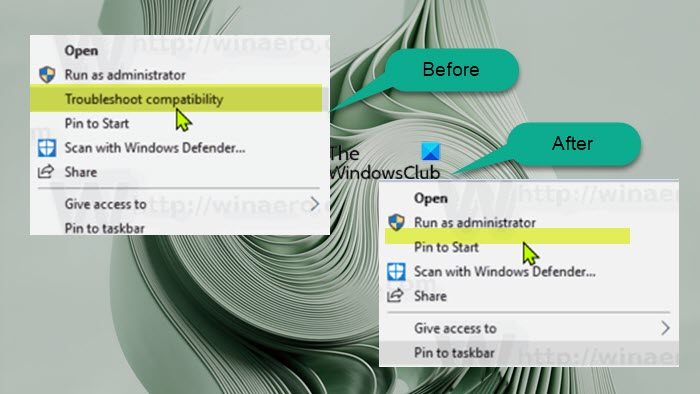Add or Remove Troubleshoot Compatibility on Context Menu in Windows 11/10
By default, in Windows 11/10, when you right-click (or for touchscreen devices, you can press and hold to perform a right-click action) on an application or game executable (.exe) file or an application shortcut, you can click/tap on the Troubleshoot compatibility item on the context menu to run the Program Compatibility Troubleshooter wizard on the program. If you want, you can remove or add this item (especially in cases where it’s missing, perhaps due to system corruption or some other reason) on the context menu by tweaking the registry as we will describe below. You must be logged in as an administrator on the system to perform this task. And since this is a registry operation, it is recommended that you back up the registry or create a system restore point as necessary precautionary measures. Once done, you can proceed as follows:
Press the Windows key + R to invoke the Run dialog.In the Run dialog box, type notepad and hit Enter to open Notepad.Copy and paste the code below into the text editor.
Add Troubleshoot Compatibility on Context Menu
Now, click the File option from the menu and select the Save As button.Choose a location (preferably the desktop) where you want to save the file.Enter a descriptive name with a .reg extension (eg; AddTC-to-CM.reg).Choose All Files from the Save as type drop-down list.Double-click the saved .reg file to merge it.If prompted, click on Run > Yes (UAC) > Yes > OK to approve the merge.You can now delete the .reg file if you like.Finally, restart the Explorer process, log off/sign out and then login/sign in or restart the computer to apply.
Remove Troubleshoot Compatibility on Context Menu
Open Notepad.Copy and paste the code below into the text editor.
Repeat all the same steps as above, but this time, you can save the reg file with the .reg extension (eg; RemoveTC-on-CM.reg).
That’s it on how to add or remove Troubleshoot Compatibility on the Context Menu in Windows 11/10! Now read: How to add or remove Compatibility Tab from File Properties
Does Windows 11 have compatibility issues?
There are known Windows 11 problems and issues. Including incompatibility issues with specific versions of drivers for Intel Smart Sound Technology (Intel SST) on Intel 11th Gen Core processors and Windows 11. Windows 11 devices with the affected Intel SST driver might receive an error with a blue screen. That said, the Compatibility tab in Windows 11/10 displays a list of settings that can be selected and applied to an app to resolve the most common issues affecting legacy applications. Read: Program Compatibility Troubleshooter not working
What is the Compatibility problem?
PC users are likely to encounter compatibility issues if using the same type of software for a task, such as word processors, that cannot communicate with each other. This could be due to a difference in their versions or because different companies make them. Software applications released should be compatible with all software, hardware, OS, platforms, etc., by running compatibility testing which helps in detecting errors before the product is delivered to the end user. Read: This app can’t run on this device – Program Compatibility Assistant.

